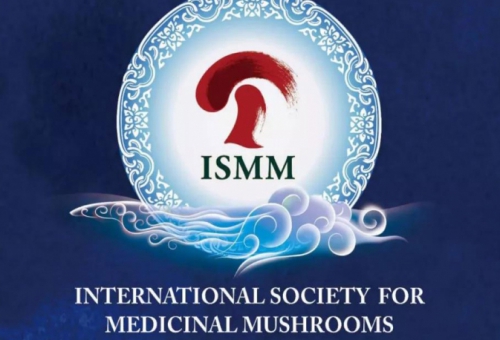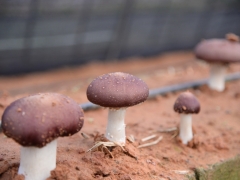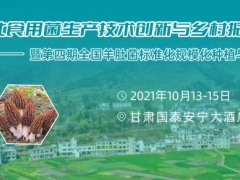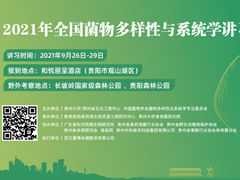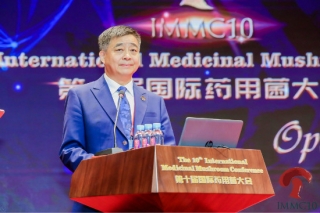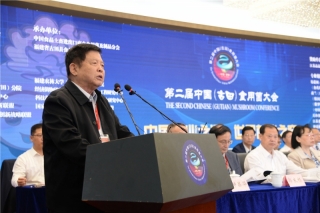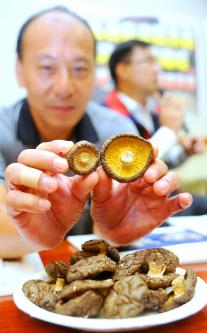
A farmer holds up mushrooms during a press conference hosted by Chinese Nationalist Party (KMT) Legislator Johnny Chiang yesterday in Taipei about mushroom smuggling. The one on the right is locally grown.
Photo: Liu Hsin-de, Taipei Times
Farmers and a legislator yesterday said that the sales of locally grown mushrooms have dropped drastically, mainly because of an influx of illegal imports of mushrooms from China.
Chinese Nationalist Party (KMT) Legislator Johnny Chiang (江啟臣) said domestic mushroom growers used to be able to sell about 2,000 to 3,000 kilograms of mushrooms each year.
The bulk of purchases usually takes place around the Dragon Boat Festival, when about 60 percent of the annual production of mushrooms is sold, Chiang said.“However, the Dragon Boat Festival this year is already over, but sales of locally grown mushrooms only reached about 30 percent, or only about half compared with the volume last year,” Chiang told a press conference at the Legislative Yuan.
“Although the volume of mushroom production this year dropped, sales still only reached about 30 percent, with another 30 percent left in warehouses,” said Lee Chuan-nien (李全年), a mushroom grower from Nantou County, adding that the poor harvest and sales have seriously affected their livelihoods.
According to the local growers, dried mushrooms from China are priced about NT$100 to NT$200 cheaper per kilogram than Taiwanese ones, but they feared the former might contain preservatives and other additives.
The quality of the mushrooms also differ, they said. Locally grown mushrooms have a smoother surface, are pale yellow and more fragrant, while those from China are cracked and darker in color, they added.
Chiang said there might be an under-reporting of the volume of imports of dried mushrooms from China.
Taiwanese customs has an import quota of 288 tonnes per annum for dried mushrooms. Add in the 71 tonnes of smuggled mushrooms recorded by the council from January and October last year, the sum would only be less than 10 percent of the total volume of locally grown mushrooms each year, Chiang said.
Statistics provided by the Coast Guard Administration also showed that the total amount of illegally imported mushrooms seized by the agency from 2007 to 2010 added up to only 58 tonnes.
As both these figures appear to be far lower than the amount being sold in local markets, Chiang said authorities should investigate how illegal imports are entering Taiwan.
“We definitely confirm to the rules and standard procedures on examining agricultural products and conduct careful inspections of suspicious cargoes or shipping records,” said Wang Ruo-lan (王若蘭), an official with the Directorate-General of Customs.
Suspected illegal samples are sent to the council for testing, she said, but added that sometimes the council failed to give clear answers so customs could not hold on the suspect items.
Chen Chi-hsiang (陳起祥), deputy director of the Agriculture and Food Agency’s Crop Production Division, said the agency has special task forces for identifying imported mushrooms by comparing samples gathered from overseas, but the information provided to customs should only serve as a reference and customs makes the final decision.
An official from the Coast Guard Administration said the agency would list mushrooms as an important item for examination this year.
Consumer Protection Committee official Chang Yu-ling (張羽伶) said the committee would cooperate with the Department of Health to investigate sources of mushrooms in the market and whether there were false labeling on the packages.
This story has been viewed 551 times.





